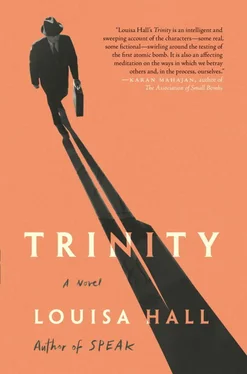For a while, he looked at that sampler. Then, finally, he started laughing.
Then I started laughing as well.
I finally saw how funny it was, that sampler my sister made for decorating your atomic bomb shelter. A sampler without any thread. Nothing there. Nothing. And that’s all we’d be left with, my sister was saying, all that would be worth depicting, all that would be worth saying, in the wake of such a disaster.
For a while, we both laughed. We laughed until tears came to my eyes, and I remembered those photographs in my sister’s book, people walking away from the ruins, their faces in the waiting room, the weeds growing green over the ashes and the bones of their loved ones.
By then Robert had fallen silent. Both of us were quiet then, and the light was fading outside his window, and so I left him alone and went back to my office.
IT WAS ONLY A FEW MOMENTS LATER THAT ROBERT CAME IN. HEclosed the door. Then he sat down.
“This is going to get very bad,” he said, “but before it does, I want you to know the whole story.”
POOR ROBERT. EVEN WITH THAT SAMPLER IN HIS HANDS, HE COULDN’Thelp it. He felt that there should be a whole story.
So he sat down in the chair and started to talk. After a few minutes I asked him if I should go get my pad, but he said, No: I just want to tell you.
Then he kept talking. He tried to start at the beginning. He told me his father emigrated from a German village called Hanau. When he arrived in New York, he began working his way up in men’s clothing. By the time he turned thirty he was one of the wealthiest fabrics men in the city. He spent his free time reading history, visiting art museums, perfecting his English.
His mother was the daughter of German immigrants who settled down in Baltimore. She was beautiful, Robert told me. She was a painter. She had blue eyes and a congenitally unformed right hand, which she kept concealed by always wearing long sleeves and a pair of chamois gloves, even when she was inside. She went to Paris to study painting, and when she got back she had a career, but she gave it up to get married.
Both his parents were Jewish, he told me, though they’d turned from the religion by the time they were married. It was an anti-Semitic time in New York. Most of the best schools and the good clubs and the nicest hotels had closed their doors to Jews. In response, prominent Jewish immigrants—those who fled to this country imagining they might not face the same barriers to opportunity—began to search for new ways to assimilate.
Many of them joined a new group, the Society for Ethical Culture, which advertised itself as a modern replacement for ancient religions. The society took a stand, Robert told me, against any spirit of exclusion, or any impulse toward segregation.
It embraced a global intellectual culture. That spirit of universality was important to his parents, Robert told me, and also to him. Jews in the society were meant to give up their biblical identity, distinguishing themselves instead through social concern and good deeds.
And Robert’s parents held themselves to those standards. His father spoke only English at home. He tried to better himself in all ways. His mother helped him. Nothing unpleasant was allowed to be mentioned at dinner. They collected art and they donated money. They lived in a sprawling, exemplary apartment on Riverside Drive, with windows facing the Hudson River, and an impressive collection of paintings, including a Cézanne and several Picassos.
A year after his parents were married, when his mother was thirty-four, Robert was born.
Four years after that, another son was born also, but he died several days later.
Then, for four more years, before his younger brother was born, Robert was all his mother had.
His childhood, Robert told me, was lonely.
He understood from the beginning that it was essential for him to be an exemplary child. His two major interests were playing with blocks and writing poems. His mother believed he would be an engineer or a poet. She watched him closely, and he was acutely aware of her loss.
To help compensate for the absence of that dead brother, and perhaps also for the loss of her career, he became a very good child.
He often painted with her in the apartment. He didn’t play with other boys. If he got his hair cut, a barber was called into the house, so he didn’t have to risk going out and exposing himself to some illness.
At some point, he told me, he started a collection of rocks. That was a great joy to him in his youth. He often persuaded his father to take him on expeditions to the Palisades, where he collected specimens, and labeled them, and carried them back to the apartment.
THAT’S WHAT HE TOLD ME. HE WENT ON AND ON: PROVIDING BACKGROUNDfor his character, a good narrative arc, all those well-placed, salient details.
We tell our lives to other people like stories. We make characters out of ourselves. If we’re skilled, we make ourselves seem almost lifelike.
Sitting there in that office, he told me that as a boy, he was prone to illness. The summer before he went to Harvard, he caught dysentery on a rock-collecting expedition. Then his father sent him to spend a summer in New Mexico, and for the first time he felt independent. He learned to ride horses. He learned to camp. He felt he was becoming himself, but then he went back to Harvard, and then he went to Cambridge, and once again he was unhappy.
He told me about the high standards he had for himself, and his fears that he couldn’t meet them, and the nervous breakdown he’d nearly suffered.
Then he told me about Göttingen, and discovering theoretical physics, and an important experience reading Proust on an island, and how after that he’d come back to this country. He stopped in New York only briefly, then kept heading west. He traveled over the whole vast, wild country, all the way to California, and he told me that he sometimes wondered if the only really happy time in his life was during those years in Berkeley, when for a moment he let go of the idea that his life should be exemplary and simply lived, surrounded by friends, Jean, and Chevalier, and Bernard Peters, surrounded by his graduate students, in a small house on Shasta Road, with a redwood-paneled living room, and a eucalyptus in the backyard, and a view of the Pacific.
Sometimes, he said, he thought about his parents. Those were the years of the Depression, but his father had done well during the first war, and the fortune remained largely unscathed, and in those years of poverty it sometimes seemed somewhat grotesque.
In Berkeley, he said, he distanced himself from his parents. But then they died, one shortly after the other, and suddenly his loneliness almost overcame him.
Then he realized he’d never been really close to anyone but his parents, and now there was no longer anyone left to be good for, and he wondered if he’d ever had a real friend on the planet.
But then he remembered Jean. And he remembered Chevalier and Peters and those students who gathered around him, drinking cheap wine and sitting on the back porch, and in those days it was a great consolation. He taught them, he told me, to appreciate Bach. He showed them his collection of rocks, and Jean got him involved in the protests, and at night, Jean came and slept over if she didn’t have to work, and if she did, he slept under the stars in that hammock.
And so on and so forth.
Robert told me his whole story, though of course sometimes there were holes. If a man told his life’s story and didn’t leave any holes, it would take him more than a lifetime to tell it.
It would take the person sitting beside him more than a whole lifetime to hear it.
So sometimes there were holes in the story, and it was always the holes that spoke to me loudest, the holes that called me back to their edges, the holes that I thought about later, and circled incessantly in my mind.
Читать дальше












